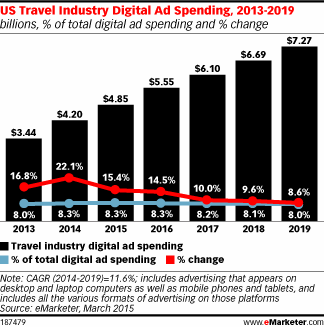Will Google Become the Next OTA?
Step by step, Google has been advancing on the $565 billion dollar travel industry. Its most recent step has been the launch of its personalized travel app, “Google Trips”. This follows Google maps, with its hotel links and prices, and the acquisition of ITA, the technology that powers Google Flights, its flight comparison and pricing engine. Add this to Google Destinations, which empowers desktop and mobile searches by offering leading attractions at a given destination and Book on Google, which allows travelers to directly book a hotel found on a Google search, and it seems as if Google is set to become the next Online Travel Agency (OTA).
Or is it?
Google knows travelers preferences and schedules, and even has access to the payment data of an ever-increasing user base, so it could become a heavyweight contender in the travel and booking industry, if it so desires. However, it appears, for now, that this is not Google’s strategy. Google’s mission is “to organize the world’s information and make it universally accessible and useful”. As such, it sees its travel tools and apps, as a fulfilment of its mission, in the travel industry.
This is not to say that hotels or flights booked via Google are royalty free. Google, like its huge customers, the OTAs, takes a commission on deals booked through its engines. However, based on Google’s own admission, royalties on bookings is currently not on its way to becoming its main revenue channel.
Google’s Revenues from Online Travel Advertising Exceeds Leading OTA’s Revenues
Google’s traditional revenue source is of course, search-based advertising. With year after year growth rates of between 8.5- 15% in digital advertising in the US travel industry, and with some of its key customers being leading OTAs, such as Priceline and Expedia, Google is not out to compete directly with these companies.

In fact, when comparing the potential revenues from the leading OTAs and TripAdvisor to Google, it becomes instantly clear why not. The 2015 revenues of the leading publicly traded OTAs were $9.2 billion for The Priceline Group, $6.7 billion for Expedia, $1.6 billion for Ctrip and $1.5 billion for TripAdvisor.
Online Travel Agencies spend a high portion of their revenue on sales and marketing. As such, Google likely earns more than The Priceline Group from its advertising services to these same OTAs and independent advertisers, such as hotel chains and airlines. According to an analysis presented on Skift, The Priceline Group and Expedia spent a combined $4.9 billion on online advertising in 2015. This spending will likely reach $6.8 billion in 2016.
Assuming a 90% share of this spending is done on Google, the leading search platform, then these two companies alone will generate $6.12 billion in revenues to Google in 2016. Additional online spending from TripAdvisor and Airbnb would add an additional projected $800 million to these revenues. As approximately 50% of Google’s travel advertising revenues are generated by suppliers (airlines, hotels, etc.), then Google’s revenues from this vertical can be estimated at over $12 billion, annually, higher than Expedia’s annual revenues, and even higher than those of The Priceline Group.
Making Information Accessible and Useful in the Mobile Travel Industry
So what is Google’s goal?
Well, let’s go back to its mission statement – making information accessible and useful. This is clear in its new and exciting mobile app, Google Trips. In his 2016 interview to Skift, VP of engineering at Google Travel, Oliver Heckmann, described the app as an itinerary management program, which pulls the travel information of the users directly from their Gmail accounts, and assists them with location-based recommendations and a day planner assistant. In other words, Google is focused on getting targeted information to the user, and in connecting these users with its partners (the advertisers) at the right moment, in order to facilitate conversions for these partners.
Similarly, with Book on Google, Google is connecting the users directly to the partner-branded, Google-hosted booking page, again providing its partners with qualified leads, likely to become conversions. Book on Google set out to improve the travel search and book experience to users. As on-the-go users spend decreasing length of time on mobile pages, it is crucial to provide a simple-to-use platform for searching and booking travel plans. With 70% of digital travelers projected to reserve hotels via a mobile device in 2019, up from 43.8% in 2015, all travel businesses should go mobile, and offer an end-to-end solution for search and booking.
In some cases, users on OTAs or hotel sites find the existing process cumbersome. Heckmann described a case where the user signs into a booking site, only to find that his email is associated with a different password. This leads to a “reset your password” prompt, which sends the user to his mailbox. After figuring out how to copy and paste the password on his mobile device to the booking site, he then has to input his payment data, if he has survived thus far and not given up.
Book on Google seeks to simplify this process, and create higher mobile conversion rates, offering a seamless mobile booking experience. Book on Google enables users to sign in with Google over partner mobile sites, and for those users with Google wallets, it even enables hassle-free booking from start to finish.
With the growth in travel, globally, it is important for all travel providers to provide a similarly smooth experience and mobile payment alternative. Tourism industry predications have this payment method consistently gaining market acceptance, from travelers in Africa through those originating from Western countries.
As such, Google remains true to its mission – making information accessible and useful, specifically in the travel industry, while empowering its customers, the OTAs and independent suppliers, by providing them with qualified leads and simplifying conversions. With so much to gain from empowering its leading customers, Google is not likely about to change its core business and competencies, so breathe easy, OTAs.

